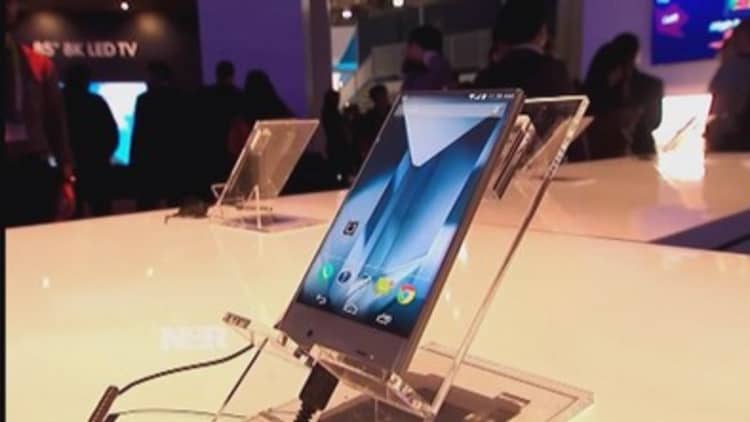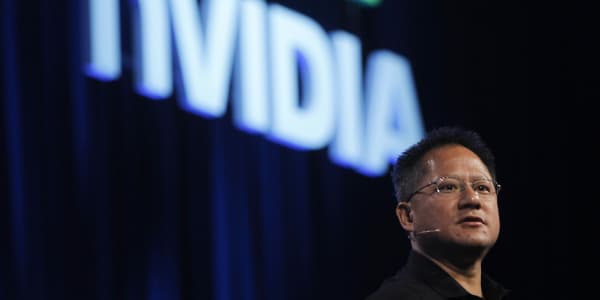CES newbies could be forgiven for roaming the never-ending show floor in search of the elusive Apple booth. With smart devices commanding the 2015 International Consumer Electronics Show, how could the dominant U.S. device maker not have a presence?
Industry veterans know better. As the annual extravaganza wraps up Friday in Las Vegas, the ending date of Jan. 9, has particular significance to techies. It's the eighth anniversary of Apple's hijacking of CES.
On Jan. 9, 2007, as 140,000 people swarmed Las Vegas and lined up for keynotes from Microsoft's Bill Gates, Walt Disney's Bob Iger and Cisco's John Chambers, Steve Jobs was 400 miles away introducing the world to the device that would change everything: the iPhone.
Read MoreIntel show & tell at CES
"It's got everything we need," Apple's co-founder and then chief executive officer told the eager audience crammed into San Francisco's Moscone Center. "Multitasking, networking, power management, graphics, security, video, graphics, audio core animation."
From our BlackBerry e-mailers, we messaged with our bosses, friends and colleagues about Jobs, Apple's surging stock price and this new touchscreen device. Though we were all at CES, the iPhone was the only subject that mattered.
"Here was a guy who hadn't committed to the show but dominated the show with a product that was unseen, effectively," said Dan Scheinman, a Cisco executive from 1992 until 2011, and now an investor in tech start-ups. "He was managing to win the show in every meeting."
The launch was particularly wrenching for Cisco, which owned the trademark on the iPhone name, and immediately filed an infringement suit against Apple, even with many of its top executives, including Scheinman, attending CES. The two companies settled the following month.
The iPhone is now on its eighth generation and producing sales of close to $100 billion a year, about 14 times BlackBerry's annual revenue. Google's Android operating system, which hit the market in 2008, is the only real challenger to Apple in the smartphone wars.

Kurt Scherf reminds us that even though Apple took over the tech industry conversation in early 2007, its success in the phone market was anything but assured. Scherf was an analyst for market research firm Parks Associates from 1998 to 2012 and attended CES almost every year.
At the time of the introduction, the iPhone was only going to be available on AT&T, and there was plenty of skepticism about whether the network could handle surging demand for high-speed data. Furthermore, Apple had no experience or history in the telecom business and was banking on its supremacy in digital music, with the iPod, translating to smartphones.
"Ahead of the iPhone launch, we like every other research firm were desperate to attach our name to anything Apple," said Scherf, who now works in Dallas for a technology services firm. "We put out a paper that basically said the iPhone is not going to be that big of a deal, that consumers aren't clamoring for it."
Why did that prediction end up being so wrong? "Apple's genius was giving people what they didn't think they wanted, and then needed," Scherf said.
Read MoreApple's record breaking year
Similar questions about Apple persist today as new categories of devices emerge. Since Jobs's death in 2011 and Tim Cook's ascension to CEO, the company has yet to convincingly enter a new market. Cook has had success with the iPad mini, after the original tablet was launched by Jobs, and he pushed Apple into larger phones with the latest generation of the iPhone.
Cook's biggest test to date will be the Apple Watch, which was introduced in September and is set to start selling in the U.S. by the end of March, according to the blog 9to5Mac.com.
An Apple spokesperson didn't respond to a request for comment.
The Apple Watch is entering a crowded market of smartwatches, featuring tech giants like Samsung as well as emerging start-ups like Fitbit and Pebble. And as usual, the Cupertino, California-based company will be pricing its devices above just about any of them.
"They have a lot of users that will pay them the price of experimentation," said Ken Dulaney, an analyst at Gartner, in an interview while walking the CES show floor. "The community believes in them so much that they'll buy them in sufficient quantities to fund future products."
Read MoreCES crowds go drone crazy
Dulaney, who's been trekking to CES for over a decade, said the 47-year-old show is still well worth attending despite Apple's longstanding absence. From drones of all sizes to smart light bulbs and intelligence embedded into everything imaginable, there's plenty of excitement to justify the trip.
But Dulaney said there is one main way that Apple continues to dominate CES.
"With all these smart things happening, everyone who shows you a demo is using an iPhone," he said.





